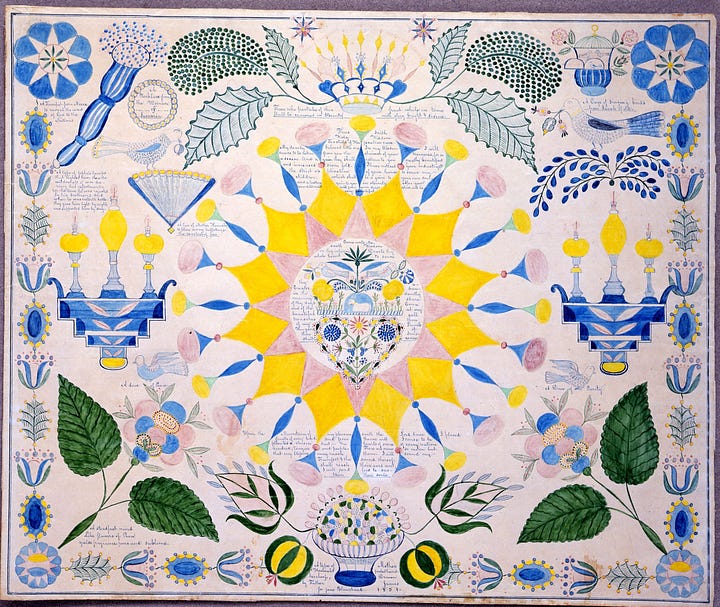In 18th century New England, there was a radical religious group who came to be known as ‘Shakers’ for their wild, ecstatic ritual dances. Shakers lived in pristine villages peppered throughout New England, where they shared all their belongings, and developed a unique style of art, music, literature, and dance. They grew their own food, made their own whimsical furniture, and purchased land to expand their communities. Today, there are only two Shakers left—Arnold Hadd, and June Carpenter. The unique and vibrant Shaker culture didn’t disappear because of war, famine, or disease; the Shakers were killed by an idea.
Ann Lee, the founder of the Shaker movement, had a series of ecstatic visions which led her to believe that sexual intercourse was the cause of the Fall of Man. Hoping to found the Kingdom of God in New England’s green and pleasant lands, Ann Lee decided that a strict and complete renunciation of sexual pleasure was needed for our salvation.
Had she kept this idea to herself, or perhaps restricted it to an inner circle of particularly devout followers, we might still find thriving Shaker communities today. However, as a charismatic preacher who believed every member of the Shaker community ought to be held to the same moral standard, she made sure every Shaker had the importance of total chastity properly impressed on them.
After an initial founding fervour of religious feeling, converts became rare, and since Shaker communities had no natural growth, villages were abandoned, and the flame of Shaker life flickered and died.


There aren’t many ideas in contemporary society that reduce birthrates as dramatically as Shaker attitudes towards sex. However, many of the ideals of contemporary Western society, like secularism and individualism, have a tendency to produce a notable decline in birthrates, and may be at risk of burning themselves out.
For example, Israel is on the cusp of an unusual demographic crisis. Secular Israelis tend to vote for moderate political parties that espouse ideals of tolerance and pluralism. The birthrate of secular Israelis is around 2.4 children per woman, but the birthrate of Ultra-Orthodox Hasidic Jews in Israel is close to triple that, at nearly 6.5 children per woman. Hasidic Jews are forming a larger and larger voting body, causing significant shifts of power in Israeli society—Hasidic Jews tend to favour political factions that want to impose a strict interpretation of Judaism on wider society and embrace religious nationalism.
Beliefs and mentalities are passed from parents to children, and are contagious through social contact within a community. This means that over the decades, the mentalities that shape our lives will arrive at the forefront of public life not necessarily because of the quality of their ideals, but because of the rate at which people who hold them reproduce.
No matter how just, noble, or high-minded an idea, ideas die when they cease to inhere in people’s minds. If ideas cause the people who have them to have fewer kids (or none at all), these ideas will extinguish themselves within a few generations.
I think it’s possible that many of the highest ideals that we hold as Westerners in the first half of the 21st century are self-extinguishing.
Secularism may be self-extinguishing since secular families have birthrates significantly below replacement—the changing demographics in Israel are a good illustration. It’s also possible that the ideal of radical individual freedom is self-extinguishing—parenthood demands serious sacrifices that are often hard to square with the desire to chase dreams that are authentically and radically one’s own. More disturbingly, it’s also possible that some strains of the environmentalist and feminist movements are self-extinguishing.
I want to be clear—I don’t think that if an idea or movement is self-extinguishing it must be wrong or bad. I simply think we need to recognize the unfortunate fact that no matter how good they are, some ideas may be difficult (or even impossible) for a culture to sustain over a long span of time.
If we admit some of the ideals we cherish are self-extinguishing, we face a stark dilemma:
On one hand, we can choose to live in line with what we believe to be good and just, and accept the haunting awareness that our way of life is like a wildflower in late summer—beautiful, yet on the cusp of disappearing. On the other hand, we could choose to look the selective power of Nature in the eye, and prune away some of our dreams and ideals—sustaining our way of life into the next generation, but being acutely aware that we might have led happier, freer, or more righteous lives had we chosen a different path.
We’re culturally poorly equipped to digest the dizzying discovery that the way of life we believe is good and just might not be able to last more than a couple of generations. We’re even less capable of dealing with the realization that a worldview we might find morally repulsive will overtake our own worldview not because our ideals are wrong or unjust, but because of the simple arithmetic of birthrates.




Day after day, week after week, month after month, I await a proper caption. But alas! the day shall never come :(
Thought-provoking essay! I wish more people understood the significance of these cultural phenomena and their implications for the preservation of the world order as it once existed. Thank you for enlightening this darkening world.